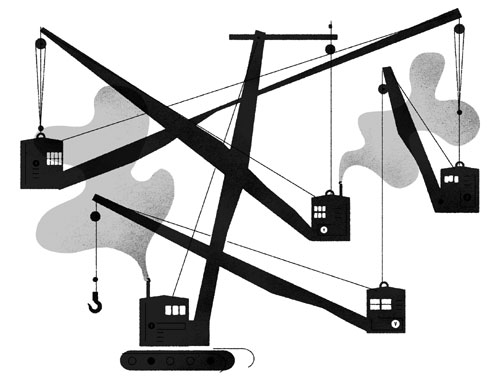Six years ago, I decided to leave Rancho Santa Fe, California, for Nashville, Tennessee. That’s a major undertaking for anyone, but particularly for a 25-year resident of Southern California, dragging his whole family and company along with him. I still remember decision day: January 5, 2006. I’d been disappointed in November by the defeat of Governor Arnold Schwarzenegger’s ballot initiatives, which aimed at reining in state spending, but I was utterly aghast as I read the transcript of the governor’s State of the State speech just days into the new year. Clearly, he had resolved to move in a big-government direction, making proposals that included issuing billions of dollars’ worth of new bonds to pay for statewide infrastructure projects. The last thing California needed was more government spending. It was time for me to go.

I’ve had a lot of company of late. Firms, people, investments, and tax revenues are fleeing California, repelled by the most onerous antigrowth business environment in the United States. California’s after-tax rate of return for doing business lags so far behind other states’ (especially zero-income-tax competitors such as Texas, Tennessee, and Florida) that the exodus shouldn’t surprise anyone. Yet the state’s Democratic leadership is pushing a November ballot measure aimed at raising income and sales taxes in order to make up for lost revenue.
Finally, a reason to check your email.
Sign up for our free newsletter today.
Tax hikes, especially during trying economic times like these, make no sense. Economies don’t tax themselves into prosperity. What California needs is a radical tax overhaul—to be precise, a single, low-rate flat tax. Such a reform would spur a renewal of economic activity and investment while continuing to raise the revenues that the state needs.
The upcoming fifth edition of Rich States, Poor States, a publication that I coauthor annually with Stephen Moore and Jonathan Williams, will show just how antigrowth California’s business environment is. Our study uses 15 pro-growth attributes to rank the states’ economic competitiveness. In the first four years of the index, California never ranked outside the bottom ten states; this year, it will probably manage that feat—just barely—thanks to the expiration of numerous temporary tax increases (several of which Democrats want voters to reinstate in November).
Taxes are indeed a big part of California’s economic problem. At 10.30 percent, the state’s top marginal personal income-tax rate is the fourth-highest in the country, and its top marginal corporate income-tax rate of 8.84 percent is 25 percent above the national average. Excessive taxation is an equal-opportunity tormentor, afflicting labor and capital, poor and rich, men and women, old and young. In the short run, higher taxes on labor or capital will reduce after-tax earnings. Some people will violate the law and fail to report taxable income; others will use legal options, including tax deductions and credits, to reduce their payments. In the long run, residents—those who can afford to, anyway—will vote with their feet and leave the state, shifting the tax burden to lower-wage workers, as well as to immobile land and property.
California’s income-tax system is also the nation’s most progressive—and that’s not a good thing. Progressive tax systems magnify tax-revenue volatility, with lots of money pouring in during periods of growth and the till running dry during downturns. This volatility occurs because wealthy people, who pay more taxes in a progressive system, experience sharp income swings from boom to bust. Depending disproportionately on the wealthy for its own revenues, the state experiences the same swings. This dynamic has a bad effect on politicians, who go on spending sprees during booms and then raise taxes during busts, harming competitiveness.
Worse, a highly progressive tax structure means that the most productive California residents and businesses—the primary employers of others—wind up taxed the most on the margin. State government figures show that in 2008, 61.3 percent of all personal income taxes—by far the state’s most important source of revenue—were paid by filers with adjusted gross incomes of over $200,000, who constituted just 4.1 percent of the population and earned 34.5 percent of all income. It’s a wonder that California has any entrepreneurs or venture capitalists left.
In the late 1800s, economist Henry George, a Californian, neatly summarized the main points of a good tax system. It should “bear as lightly as possible upon production—so as least to check the increase of the general fund from which taxes must be paid and the community maintained,” he wrote. It should be “easily and cheaply collected, and fall as directly as may be upon the ultimate payers—so as to take from the people as little as possible in addition to what it yields the government.” It should be “certain—so as to give the least opportunity for tyranny or corruption on the part of officials, and the least temptation to law-breaking and evasion on the part of the taxpayers.” Finally, George argued, a good tax system should “bear equally—so as to give no citizen an advantage or put any at a disadvantage, as compared with others.”
California should follow George’s instructions by scrapping all its state and local taxes and fees (except for sin taxes, which exist to modify behavior rather than to raise revenue) and replacing them with a flat tax of about 6 percent on two distinct bases. One tax base would be personal unadjusted gross income from all sources, with only a few deductions: charitable contributions; interest payments, including on home mortgages; and rent on one’s primary residence, to remove the current system’s preference for homeowners. A single tax rate would apply across the board, from the first dollar earned to the last. The other tax base would be businesses’ net sales, or “value added”—that is, the difference between sales and production costs, which equals the state’s gross domestic product when aggregated across California. The low 6 percent rate would reduce the incentive to avoid earning taxable income in California, and the very broad base would reduce the number of places where people could hide their income to avoid taxation.

That’s it. This tax system would yield as much revenue as all of California’s current state and local taxes. At the state level, the taxes on business profits, payroll, gas, capital gains, and stock options would disappear. Locally, property taxes would follow suit. All sales taxes—state, county, city, and special-district—would likewise be abolished.
Such a tax reform would spark a surge in economic activity in California, since the after-tax rate of return for doing business would rise, both from the decline in tax rates and from the elimination of myriad fees that harm productivity. The result would be more businesses moving into California, fewer moving out, and more economic activity emerging from the underground economy. The California economy would soar, generating higher tax revenues, which would reduce the state budget deficit. The revenue stream would also be far more stable from year to year.
Californians may recognize this proposal as similar to one offered 20 years ago by, of all people, Jerry Brown. When California’s current governor was running for president in 1992, he campaigned on a flat tax—a 13 percent national rate for everyone, regardless of income. In fact, Brown and I developed that proposal together.
As of March, California has a projected general-fund deficit of $9.2 billion—and that doesn’t include local government deficits or the state’s growing unfunded entitlement and pension liabilities. Governor Brown is intent on raising taxes to avert further spending cuts. But with California’s unemployment rate at 10.9 percent—among the highest in the nation—raising taxes on those still holding jobs will only make things worse. The governor should recall his old enthusiasm for the flat tax, which the state needs more than ever.
Without question, other major reforms are also needed in California. One could get lost for weeks in the state budget, with its vast unfunded liabilities, and come up with innumerable ways to save money that most Californians would find reasonable. (In our new book, Eureka! How to Fix California, Wayne Winegarden and I suggest some.) But the tax reform that I’ve outlined would be a big step toward California’s becoming the Golden State again.




